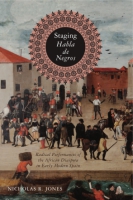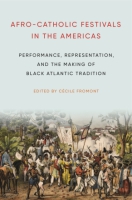Cervantine Blackness
Nicholas R. Jones
“Cervantine Blackness compels us to look deeper and engage with Blackness in ways that disrupt conventional categories of race and genre. It is a call to rethink the ideological underpinnings of early modern literature and to reconsider who and how they are represented—both historically and in today’s scholarship. This book will undoubtedly have a lasting impact, broadening the scope of Cervantes studies and, by extension, early modern Spanish studies as a whole.”
- Unlocked
- Description
- Reviews
- Bio
- Sample Chapters
- Subjects

An Open Access edition of Cervantine Blackness is available through PSU Press Unlocked. To access this free electronic edition click here. Print editions are also available.
In this unflinching critique, Jones charts important new methodological and theoretical terrain, problematizing the ways emphasis on agency has stifled and truncated the study of Black Africans and their descendants in early modern Spanish cultural and literary production. Through the lens of what he calls “Cervantine Blackness,” Jones challenges the reader to think about the blind faith that has been lent to the idea of agency—and its analogues “presence” and “resistance”—as a primary motivation for examining the lives of Black people during this period. Offering a well-crafted and sharp critique, through a systematic deconstruction of deeply rooted prejudices, Jones establishes a solid foundation for the development of a new genre of literary and cultural criticism.
A searing work of literary criticism and political debate, Cervantine Blackness speaks to specialists and nonspecialists alike—anyone with a serious interest in Cervantes’s work who takes seriously a critical reckoning with the cultural, historical, and literary legacies of agency, antiblackness, and refusal within the Iberian Peninsula and the global reaches of its empire.
“Cervantine Blackness compels us to look deeper and engage with Blackness in ways that disrupt conventional categories of race and genre. It is a call to rethink the ideological underpinnings of early modern literature and to reconsider who and how they are represented—both historically and in today’s scholarship. This book will undoubtedly have a lasting impact, broadening the scope of Cervantes studies and, by extension, early modern Spanish studies as a whole.”
“For a work that averts standard academic forms, Cervantine Blackness succeeds in fulfilling the objective of questioning Western readings of Blackness in and around the works of Cervantes. It should be read by all scholars of Cervantes and those interested in critical theories of the Black Atlantic.”
“Nicholas R. Jones challenges conventional boundaries of literary form, critical argument, and scholarly engagement. He compels early modern scholars to rethink not only the representation of Blackness, but also the ways in which an interdisciplinary approach reshapes our reading of Cervantes and early modern literature. Whether one is deeply immersed in Cervantes studies, or is simply curious about how scholarship within early modern literature can evolve, Cervantine Blackness is a necessary and transformative read.”
“Cervantine Blackness dazzles: a fearless second book that invokes Black studies to explode its disciplinary paradigms. This book interrogates the complex archival and transhistorical roles that Blackness, Black people, and Black scholars navigate, refusing the easy legibility of the frameworks of agency versus oppression. Nicholas R. Jones’s searing indictment of early modern Iberian studies bursts forth from the confines of his previous scholarly skin much like the serpentine imagery that propels his reevaluation of the Cervantine.”
“Cervantine Blackness is an exceptional example of how literary analysis, history, philology, and critical race theory can be perfectly integrated to offer new perspectives on early modern Iberian blackness. Jones provides fresh and innovative insights and contributions that are sure to inform and shape future research and scholarship in the field.”
“Cervantine Blackness is a homily. Jones forces readers to reckon with the perils of frameworks that flatten Black people into caricatures that appease white imperial and slavocratic sensibilities. The good news is Jones does not leave us despondent. Incorporating the dynamism of critical Black studies into Cervantine studies, Jones offers theories of Blackness that makes room for characters to move in undulating complexity. This book is an edifying sermon for honest, diligent, and creative thinkers.”
Nicholas R. Jones is Assistant Professor in the Department of Spanish and Portuguese at Yale University. He is the author of the prize-winning Staging Habla de Negros: Radical Performances of the African Diaspora in Early Modern Spain, also published by Penn State University Press, and coeditor of Early Modern Black Diaspora Studies: A Critical Anthology and Pornographic Sensibilities: Imagining Sex and the Visceral in Premodern and Early Modern Spanish Cultural Production.
Download a PDF sample chapter here: Prologue
Mailing List
Subscribe to our mailing list and be notified about new titles, journals and catalogs.








